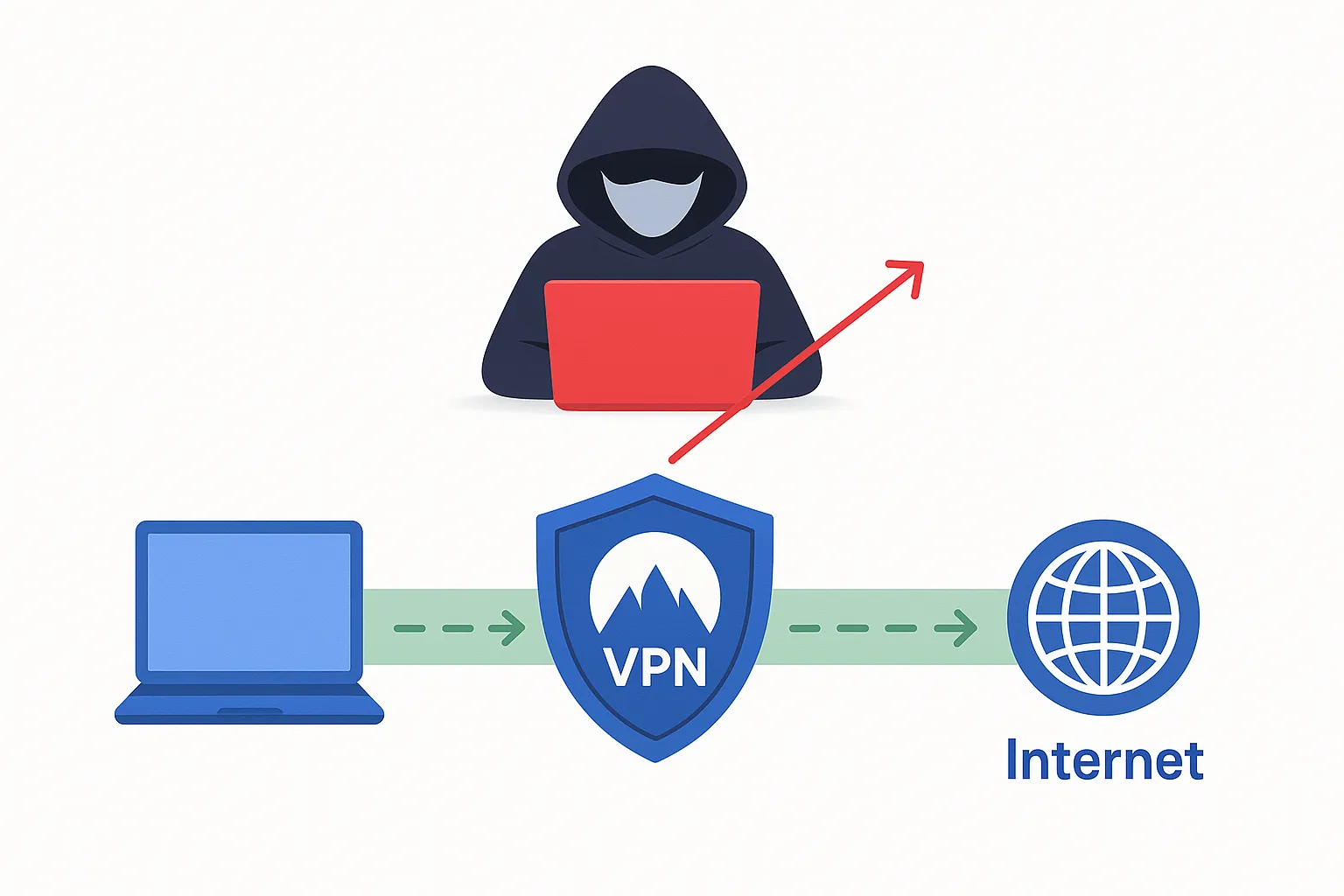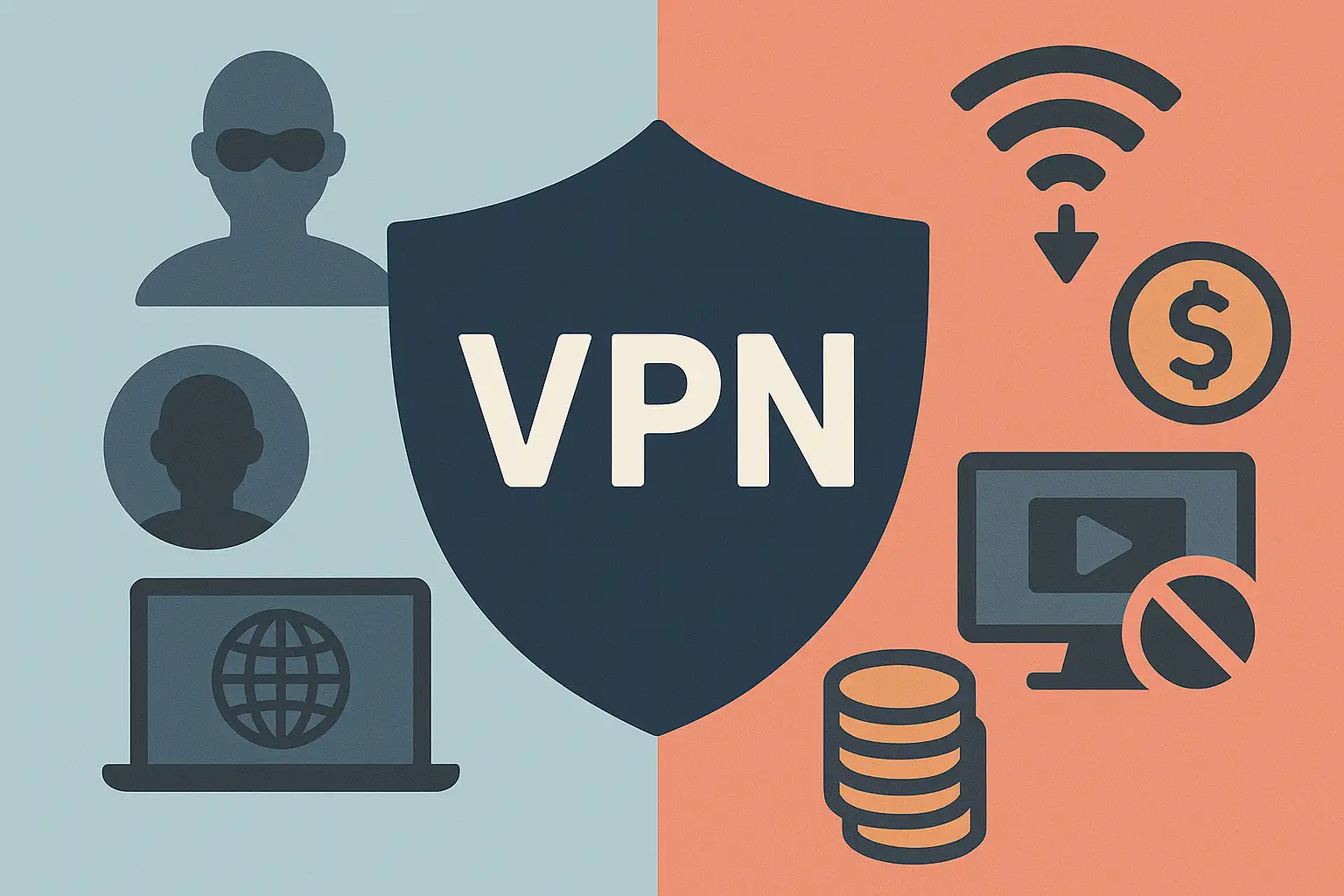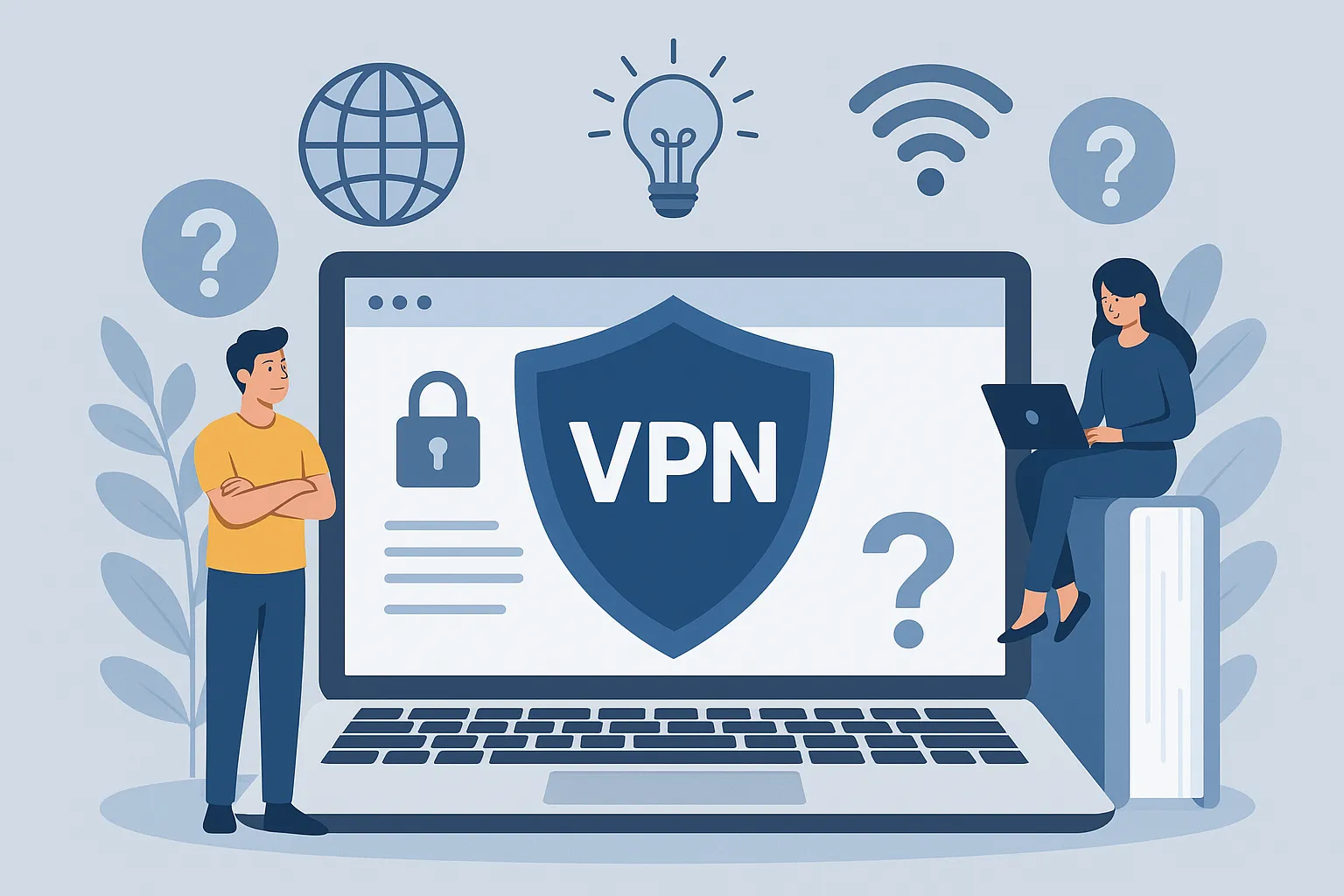Ever feel like someone might be peeking over your shoulder when you’re online? In 2025, with hackers, snoops, and big companies all eyeing your data, you have every right to be concerned. That’s where a VPN swoops in as your personal internet superhero. A VPN (Virtual Private Network) creates an encrypted tunnel for your internet traffic, hiding your identity and keeping your data safe. Consider it like putting on an invisibility cloak while you browse – suddenly, prying eyes can’t see what you’re up to.
This guide will break down everything you need to know before buying a VPN, especially if you’re a beginner. We’ll use simple analogies (imagine secret tunnels and digital disguises), tackle common fears (“Will it slow my internet?” “Is it legal?”), and highlight what features to look for. By the end, you’ll be equipped to choose the perfect VPN with confidence – and maybe even impress your friends with your VPN savvy. Let’s dive in!
What Is a VPN and Why It Matters in 2025
A VPN is a tool that creates a secure, private connection over the internet. Instead of your data taking the usual route (visible to your Internet Service Provider and potentially others), it goes through an encrypted tunnel to a VPN server before reaching the wider web. This makes your online activity virtually invisible to outsiders. Think of it like sending secret messages in a code that only you and the VPN server can understand.
A VPN acts like a secure shield between you and the internet, keeping hackers and snoops out. Your device’s traffic goes through the VPN server (shield) before reaching the internet, so bad actors can’t see your real data.

Why does this matter so much in 2025? Because our lives are more digital than ever:
- Privacy & Security: Every time you connect to public Wi-Fi (at a cafe, airport, hotel, etc.), it’s a bit like shouting your personal business in a crowded room. Without a VPN, hackers can eavesdrop on your passwords or private info. Using a VPN encrypts your data, turning it into gibberish for anyone who tries to intercept it. In fact, over 1.6 billion people worldwide use VPNs to protect their data in 2025.
- Streaming Freedom: A VPN can make it look like you’re browsing from another region. For example, connect to a US VPN server from Europe and voilà – the site thinks you’re in the US. With so many streaming platforms and regional catalogs in 2025, VPNs have become the secret key to access everything you want to watch.
- Gaming: Gamers use VPNs to avoid DDoS attacks and to play on servers in other regions. It’s like an extra shield for your online play. A VPN might slightly increase your ping, but many gamers find the trade-off worth it for the added security and ability to join friends overseas.
- Working Remotely & Travel: If you work remotely or travel often, a VPN is invaluable. It secures your work data on public Wi-Fi and helps bypass local internet censorship when you’re abroad. Think of it as your trusty travel companion – keeping your connection safe and giving you access to your usual sites and services wherever you are.
In a nutshell, a VPN is a simple app that makes a huge difference in protecting your online life. Whether you’re shopping online, checking email, or streaming music, it keeps your information for your eyes only. Given the state of online privacy in 2025, a VPN has gone from a nerdy nice-to-have to an essential tool for everyday internet users.
Pros and Cons of Using a VPN

Like any tool, VPNs come with their perks and quirks. Let’s break down the major advantages and disadvantages of using a VPN:
Pros of a VPN:
- Enhanced Privacy: Your internet traffic is encrypted and your IP address is hidden. This means websites and advertisers have a much harder time tracking you. It’s like driving an unmarked car – you leave less of a trail.
- Better Security: VPNs protect you from hackers on public networks. If someone tries to snag your data, they’ll only see scrambled code thanks to encryption. (Remember the postcard vs. sealed envelope analogy: a VPN is the sealed envelope for your data).
- Access to Content: Bypass geo-blocks and censorship. With a VPN, you can surf as if you’re in another country. Say goodbye to “This content is not available in your region” messages.
- Peace of Mind: Even if you think “I have nothing to hide,” it’s comforting to know your ISP or nosy third parties aren’t logging everything you do. Privacy isn’t about hiding bad things; it’s about protecting your right to not broadcast everything.
Cons of a VPN:
- Potential Speed Reduction: Because your data takes a slight detour (through a VPN server) and gets encrypted, it can slow down your connection. The key word is “can” – good VPNs are so fast you might not notice a big difference. But if your base internet is slow, a VPN might make it a bit slower.
- Cost: Quality VPNs aren’t free. You’ll typically pay a monthly or annual subscription. (Yes, there are free VPNs, but they often come with limits or risks – more on that in the Pitfalls section). Think of it as buying a lock for your house; a small price for security.
- Service Restrictions: Some websites or streaming services try to block VPN users. It’s a cat-and-mouse game – today’s VPN might work with Netflix, but tomorrow you might need to switch servers if one gets detected. Most top VPNs find workarounds quickly, but it can be an occasional annoyance.
- Legal Considerations: In most countries, VPNs are perfectly legal for personal use, but a few (like China or Iran) restrict them. If you’re in or traveling to a region with VPN bans, be cautious and research the rules. For the vast majority of users, there’s no law against using a VPN – millions of people use them for legitimate reasons every day.
Key VPN Terms Explained (No Jargon Overload)
VPN providers tend to throw around fancy terms. Let’s decode the most common ones you’ll encounter, in plain English:
- Encryption: This is the core of what makes a VPN secure. Encryption scrambles your data using complex math so no one can read it without the decryption key. It’s like speaking in a secret language that eavesdroppers can’t understand. Strong encryption (often called “AES-256” or “military-grade”) is virtually unbreakable, so your information stays safe.
- No-Logs Policy: “No logs” means the VPN service doesn’t keep records of what you do online. A good no-logs policy ensures that even if someone (say, law enforcement) asked the VPN company for your browsing history, there’d be nothing to share. It’s like the VPN has amnesia about your session as soon as you disconnect. Many top VPNs have had independent audits to verify their no-logs claims.
- Kill Switch: A safety feature that automatically cuts your internet connection if the VPN drops. This prevents your data or real IP from leaking out unprotected by accident. Think of it as an emergency brake – if your secure tunnel breaks, everything stops until protection is back.
- VPN Protocol: The technical method a VPN uses to tunnel your data. Common ones include OpenVPN, IKEv2, and WireGuard. You don’t need to get too into the weeds here – just know that modern protocols like WireGuard offer improved speed and security. Most VPN apps let you choose the protocol or automatically pick the best one for you.
With these terms demystified, you’ll better understand VPN features and marketing lingo. No more scratching your head at acronyms – you’re officially a mini VPN expert now!
Pitfalls to Avoid When Buying a VPN
Not all VPNs are created equal, and the last thing you want is a false sense of security. Here are some common traps and pitfalls to watch out for when shopping for a VPN:
- The “Free VPN” Trap: Free VPNs sound tempting – who doesn’t love free stuff? But remember, if you’re not paying, you might be the product. Many free VPNs make money by logging your data and selling it to advertisers or by injecting ads into your browsing. Some have even been caught bundling malware. They also tend to have strict data limits, fewer server options, and slower speeds. A free VPN might be okay for a quick, occasional use, but relying on one long-term is risky. (If you really need a free option, choose one from a reputable company with a limited free plan – but for heavy use, a paid VPN is worth it.)
- Hidden Data Logging: Just because a VPN advertises “no logs” doesn’t always mean it’s 100% true. Some VPNs have been busted for keeping logs despite their claims. Always check if the VPN has had an independent security audit or if there are news stories about it handing over data. Reputable providers are transparent about what information (if any) they keep. Be wary of services with very vague or confusing privacy policies.
- Overhyped Security Claims: Buzzwords like “military-grade encryption” are common – and yes, strong encryption is good – but don’t be swayed by marketing alone. Also, be cautious of outlandish promises. If a VPN claims to make you “100% anonymous” or “invincible online,” take it with a grain of salt. A VPN greatly improves privacy, but it doesn’t give you a license to do anything illegal or careless. Stay smart about your security habits.
Avoiding these pitfalls will save you time, money, and headaches. Do a bit of homework on a VPN’s reputation and read user reviews. In short: be picky about who you trust with your data – it’s worth it.
How to Choose the Right VPN for Your Needs
There are dozens of VPNs out there. How do you pick the one that’s just right for you? The trick is to consider what you’ll use it for and what features matter most for that purpose. Here are some common scenarios and what to look for in each:
- Streaming Movies & Shows: If binge-watching is a priority, choose a VPN known to work with streaming services. Not all VPNs can evade Netflix or Disney+ blocks, so look for recent reviews or recommendations specifically for streaming. Speed is also key here – you want HD video without buffering. Many top VPNs advertise their streaming prowess, but user feedback will tell you who actually delivers.
- Torrenting & P2P Downloads: If you plan to torrent, pick a VPN that explicitly allows P2P file-sharing on its servers (many do). You’ll want a strong no-logs policy and a reliable kill switch to keep your downloads private. Good download speeds are important too. VPNs like NordVPN, Surfshark, or Private Internet Access are popular among frequent downloaders for their mix of speed and privacy.
- Travel & Censorship Bypass: Going to a country with internet restrictions (like China or UAE)? Look for a VPN that offers obfuscated servers or a “stealth” mode to hide the fact that you’re using a VPN at all. Also, a large global server network is useful so you can access content from your home country while abroad. ExpressVPN, for instance, has a solid track record for working in countries with heavy censorship, making it a trusty choice for travelers.
- Gaming: If your main concern is secure gaming or accessing region-locked game servers, focus on VPNs known for low latency connections. Some services offer anti-DDoS protection on certain servers, which can be great for competitive play. Keep in mind that a VPN might slightly increase your ping, so you might not use it all the time – just when you need that extra protection or to play with friends overseas. Many gamers test a VPN with a game’s specific server to see how it performs before committing.
Once you identify your primary needs, it narrows down the choices. Many top VPNs cover all these bases pretty well, but some specialize in certain areas. Don’t be afraid to take advantage of free trials or 30-day money-back guarantees – it’s a common way to test a VPN and see if it fits your needs.
Pro Tip: Make a short list of your must-haves (e.g., “Needs to work with Netflix on my TV and be easy to use”). As you research, see which VPNs check all those boxes. That way, you’ll end up with a service that feels tailor-made for you.
Top VPN Providers in 2025 (Our Recommendations)
To make your VPN shopping easier, here are some of the top VPN services in 2025 that consistently earn praise from users and reviewers alike. These providers are user-friendly, secure, and reliable — you really can’t go wrong with any of them. Bonus: they all come with money-back guarantees, so you can try them out risk-free.
- ExpressVPN: Best all-around. Known for blazing fast speeds and rock-solid security. ExpressVPN has servers across 90+ countries and easy-to-use apps for all devices. It’s a top choice for streaming (works with tons of platforms) and for overall privacy. While it’s a bit pricier than some others, its reliability and 24/7 customer support make it worth the money for many.
- NordVPN: Feature-packed and trustworthy. NordVPN has 5000+ servers worldwide and advanced features like Double VPN and malware blocking. It’s great for streaming and torrenting thanks to its speed and security combo. NordVPN is based in Panama and has a strict no-logs policy (verified by independent audits), so it’s a solid pick if privacy is a priority. It also often offers very affordable deals if you sign up for a longer plan.
- Surfshark: Best value for multiple devices. Surfshark is a budget-friendly VPN that doesn’t skimp on features. One account lets you connect unlimited devices simultaneously, which is a huge plus for families or gadget geeks. Despite its lower price, Surfshark offers strong encryption, a clean no-logs policy, and speedy servers that handle streaming and gaming with ease. It’s a lot of bang for your buck.
If you’re looking to protect your whole household (or just all your gadgets), Surfshark offers unlimited device connections on a single account. It’s budget-friendly without compromising on speed, encryption, or unblocking capabilities. A strong pick for streamers, families, and everyday users.
Each of these providers brings something unique to the table — whether you value speed, privacy, streaming access, or budget flexibility. Browse through their offers and features to find the one that fits your needs best.
🛍️ Looking for the best current deals?
Check our homepage and comparison pages — we regularly update offers, coupons, and exclusive promos so you can score the best VPN for less.
Conclusion: Secure Your Digital Life Today
A VPN isn’t just for techies anymore — it’s essential for anyone who wants privacy, freedom, and security online. Whether you’re streaming your favorite shows, working on public Wi-Fi, or just want to keep your digital life protected, a good VPN has your back.
Take the first step toward safer browsing and open access. Pick a provider that fits your lifestyle — and enjoy a more private internet experience starting today.


